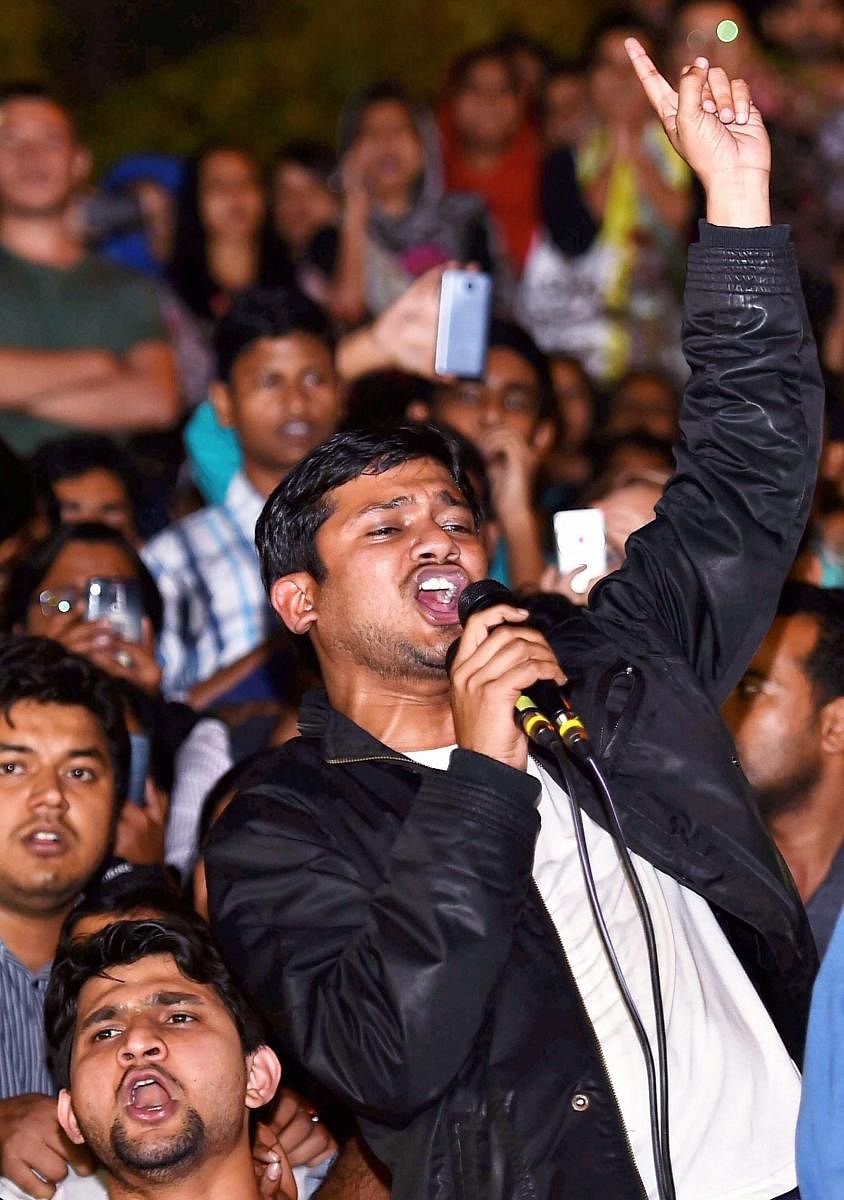
Where is the life we have lost in living?
Where is the wisdom we have lost in knowledge?
Where is the knowledge we have lost in information?
— T S Eliot
Although it is for the legal system to decide whether the sedition charges filed against Kanhaiya Kumar and a group of Jawaharlal Nehru University (JNU) students have substance or are politically motivated, one thing is certain: we are living at a time when the terribly insecure ruling regime tends to suspect every act of dissent as potentially ‘anti-national’. No wonder, universities as sites of politico-intellectual vibrancy and nuanced debates are not always seen positively.
The meticulously designed social media campaign against JNU, I believe, ought to be seen in this context. It is not merely about Kanhaiya Kumar or Umar Khalid, or the specificity of their cases. What is important to realise is that these days, the very spirit of critical pedagogy or dissenting voices is in danger; and any alternative reading of the nation and nationalism is seen to be ‘pathological’.
As a teacher, I have always believed that a university has to be seen as an inter-subjective space that allows epistemological pluralism and multiple worldviews to flourish. Its ‘order’ emanates from intellectual freedom, contestation of ideas, and constant conversations — say, between a ‘value-neutral’ scientist and a ‘politically charged’ historian, or between a ‘radical’ student imagining a different world and a ‘conservative’ Sanskrit professor regarding select ‘Hindu texts’ as the soul of Indian civilisation. Hence, a university cannot be governed by the logic of military discipline, or the monologue of the singular authority. It needs what I love to regard as the power of empathy or understanding, and the art of living with differences.
Let me illustrate my point. I continue to see Mohandas Karamchand Gandhi as one of the finest minds India has ever produced. But then, many of my Ambedkarite students — possibly, because of the historic Gandhi-Ambedkar debate on the caste question — disagree with me and, at times, interrogate my ‘upper caste’/privileged background.
I don’t think that they are destroying the sanctity of the teacher. Instead, they are doing what studentship demands: the courage to interrogate even the authority of the teacher. Hence, I see it as normal and even desirable, because intellectual contestation or political difference helps us to evolve and grow, and prepare the ground for the ‘fusion of horizons’.
My skill of empathy is sharpened. I, therefore, understand what my Kashmiri student — a bright, tender, spiritually cultivated Muslim girl — means when she tells me that whenever she sees the army convoy, her body begins to tremble. Yes, a university is a place of understanding; its vice-chancellor, I must say, should not see himself as an army general demanding absolute conformity to the signals he emits.
It is in this context that a university has to be celebrated as a place of diverse and conflicting ideas on nationhood, nationalism and patriotism. The act of learning, I believe, is never outside politics. By politics, I mean one’s location in the discourse of power: the way it is possessed, exercised, and its implications in the lives of diverse groups of people. No wonder, a meaningful engagement with critical pedagogy motivates the young learners and experienced teachers to reflect on caste and class, gender and patriarchy, and nation and identity. And hence, as they engage with history, political theory, sociology and even physics, they begin to debate.
What sort of a nation is India with its mindboggling differences? Is there a danger that in the name of ‘nationalism’, the tyranny of majoritarianism can further stigmatise the marginalised communities? Can people — the tribals in Chhattisgarh, the poor in Jharkhand, the Muslim artisans in a ghettoised slum in Delhi — feel a sense of belonging to the nation amid such asymmetrical distribution of economic and social capital? Or, for that matter, is there a danger of undue militarisation of the consciousness and resultant construction of an ‘enemy’ leading to the mob psychology of hatred?
How is it possible for bright/dialogic/critical young minds to believe that there is only one discourse of nationalism that the likes of Golwalkar and Savarkar have created? The fact is that they have felt every word Saadat Hasan Manto wrote about Partition violence; they have been reminded by Rabindranath Tagore that militant nationalism could prove to be a menace; and Gandhi with his engaged ahimsa has haunted them time and again as they experience all sorts of brute force in the name of the nation. In other words, to love the nation is to fight (I mean a non-violent struggle with a faith in the flow of Indian civilisation) for its people: their social security, cultural articulation and economic empowerment.
It is, therefore, possible for young minds to articulate their anger and discontent; it is possible for them to demand azadi or freedom from patriarchy and casteism, crony capitalism and violent developmentalism; and out of immensely energetic youthful spirit, they can imagine yet another India that takes care of its people. Why should it be seen as a conspiracy against the nation? Possibly, it is genuine patriotism.
Let the court decide on the sedition charges. But then, are you and I so insensitive that we would continue to sing in tune with the noisy television channels, and refuse to understand the creatively nuanced political language of the sensitive youth?
(The writer is a Professor of Sociology at JNU)